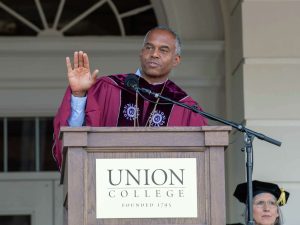Two of America’s greatest financiers lay out fears and criticize capitalism
May 2, 2019
Jamie Dimon and Ray Dalio may be two of the biggest names in finance.
This week, the two of them had some interesting commentary on the future of capitalism and the global economy.
Dimon is the chairman and CEO of JPMorgan Chase, the largest bank in the United States.
He has held that role since 2005 when JPM and Bank One, at the time the nation’s fifth largest bank, merged.
He successfully shepherded JPM through the 2008 financial crisis, for the most part avoiding the most toxic assets and mortgage backed securities.
Then, he leveraged the firm’s so-called “fortress balance sheet” to become the nation’s largest bank out of the rubble of the crisis.
Dimon is also the only chief executive who survived the crisis to still be running their company after Lloyd Blankfein, the former CEO of Goldman Sachs, stepped down at the end of last year.
In his annual letter to shareholders, Dimon highlights a few key risks to the future global economy, including an unsuccessful trade deal with China and the rapid growth in debt – sovereign debt is not worrisome but leveraged lending certainly is – and what he calls future “bad public policy,” including deep political gridlock, an issue that he gets back to later.
Dimon is a staunch capitalist and admits that he does not fully agree with the Dodd-Frank regulations imposed on large financial institutions after the crisis, although he admits that they fixed some of the underlying issues.
However, he highlights partisanship and its crippling effect on the government ability to enact policy as a major issue despite the fact that gridlock means no additional regulation, which is generally hailed as a good thing by financial institutions.
Although Dimon has arguably been one of the greatest beneficiaries of American capitalism, he voices his concerns to shareholders about many social problems and inequalities rising from the system.
Dimon, the son of Greek immigrants, is highly worried about the “fraying of the American Dream.”
He pushes back against blaming capitalism and embracing socialism, as many Democratic candidates seem to be doing, but instead calls for reforms and building a stronger social safety net.
Finally, despite the fact that some thought him a potential Democratic candidate for 2020, Dimon would like to recuse himself from politics and abolish both the Democratic and Republican parties for their high levels of partisanship.
In his role as an advisor to President Trump on the business roundtable he has pushed, albeit unsuccessfully, for higher government spending on infrastructure and legalizing many illegal immigrants.
Dalio, on the other hand, takes a much more radical view titling his piece to followers on LinkedIn, “Why and How Capitalism Needs to be Reformed.”
Dalio is closer to the embodiment of the American Dream.
Growing up in Brooklyn to a jazz musician father and a stay-at-home mother, he went on to found the investment firm Bridgewater Associates out of his apartment, which grew to become the world’s largest hedge-fund manager.
Dalio gained recognition when, in the spring of 2007, his firm had predicted the housing market collapse before it happened.
He published the piece titled “How the Economic Machine Works: A Template for Understanding What is Happening Now” to describe the crisis and managed to completely avoid the losses for its investors.
In the second line of his article, while talking about his career, in which he has amassed over 18.6 billion dollars, Dalio states, “Over these many years I have also seen capitalism evolve in a way that it is not working well for the majority of Americans because it’s producing self-reinforcing spirals up for the haves and down for the have-nots.”
He cites statistics of capitalism’s failures through studies showing real income for the majority of Americans has not meaningfully increased since the 1980s, driving massive and increasing wealth and income inequality.
He pushes back both against socialism and populism, comparing the rise of populism seen today to the 1930s.
Like Dimon, Dalio attacks the party polarization occuring in U.S. politics.
Dalio leaves us with the most powerful statement at the beginning of his piece: “I believe that all good things taken to an extreme can be self-destructive and that everything must evolve or die. This is now true for capitalism.”
Some ask why they should we listen to these two stalwarts of business other than the fact that they have been exceptionally successful in their respective fields?
Supporters argue as the 10-year bull market continues to break all-time highs, these two men are beginning to sound the alarm bells, albeit in a different way than they both did before the last financial crisis.
Furthermore, both these leaders seem to be putting their money where their mouths are. Some of the solutions named in both of their letters, namely better education and job training, have been directly addressed through their own philanthropic activities.
Dalio and his wife have personally donated over $100,000,000 to help create a $300,000,000 fund in Connecticut to help reduce drop-out rates in underserved communities and schools.
Dimon and his wife have donated over $600,000,000 to help develop job training and affordable housing in Detroit, Michigan.






